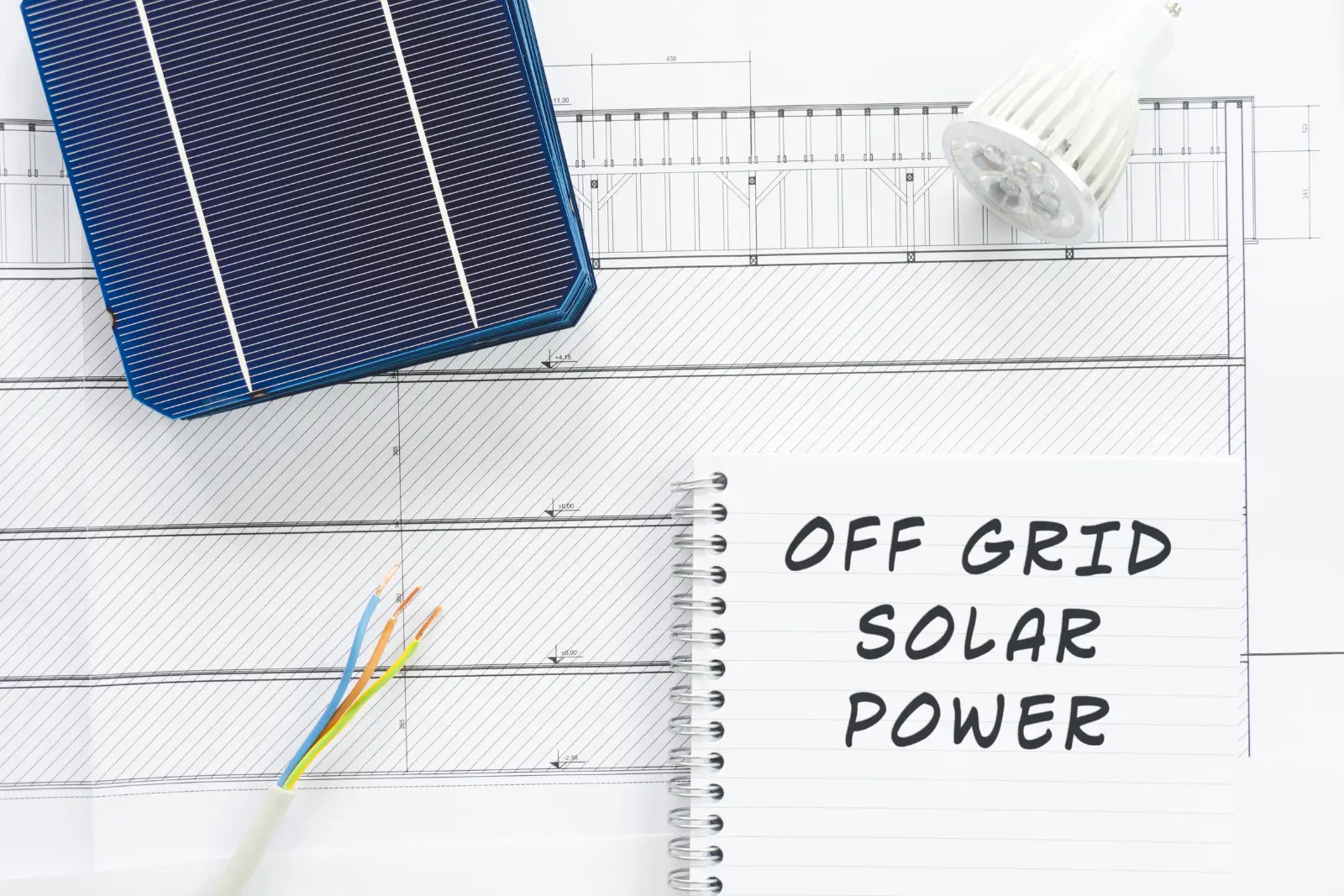Off grid solar systems have become increasingly popular as a reliable and eco-friendly way to power homes and businesses. These systems require batteries to store solar energy for use when the sun is not shining. Choosing the right batteries for off grid solar power is essential to ensure reliable and long-lasting energy storage. In this article, we will explore the best battery options for off grid solar power and why lithium batteries, specifically LiFePO4, are considered the top choice.
Key Takeaways:
- Lithium batteries, specifically LiFePO4, are the best batteries for off grid solar power.
- Off grid solar systems require reliable, long-lasting, and efficient batteries.
- Lead acid, AGM, sealed gel, and lithium batteries are the main types of batteries for off grid solar power.
- Lithium batteries offer advantages such as longer lifespan, high energy density, fast charging, and low maintenance requirements.
- Choosing the best batteries is crucial for a successful off grid living experience.
Off Grid Batteries: Essential for Reliable Solar Power Storage
Off grid batteries are essential for reliable solar power storage in off grid solar systems. With grid-tied or hybrid systems, solar energy can be used without batteries. However, in off grid systems, batteries are necessary to store solar energy for use when the sun is not generating power. Without reliable batteries, there is a risk of running out of energy during cloudy days or at night. Choosing the right batteries is crucial to ensure uninterrupted power supply in off grid solar systems.
The Importance of Reliable Batteries in Off Grid Living
Reliable batteries are a crucial component of off grid living, enabling individuals to rely on renewable energy sources and live independently from the traditional electricity grid. The popularity of off grid living is on the rise, with more people opting to build eco-friendly tiny houses, install solar panels on rooftops, and embrace solar power as a means of saving money. However, without reliable solar power batteries, it is simply not possible to store the energy generated by solar panels for later use.
Off grid living requires reliable batteries for a variety of reasons. First and foremost, batteries act as a storage solution, allowing you to capture and store the energy generated by your solar panels during the day, so you can use it when the sun isn’t shining or during periods of high electricity demand. Having reliable batteries gives you peace of mind knowing that you have a consistent and sustainable power source to rely on, even in remote or off grid locations.
By investing in reliable off grid solar power batteries, you can ensure that you have a continuous and uninterrupted power supply, regardless of the weather conditions or time of day. With the right batteries, you can power your home, appliances, and devices with clean and renewable energy, minimizing your carbon footprint and reducing reliance on non-renewable energy sources.
“Reliable batteries are the backbone of off grid living, providing the energy storage necessary to sustain a self-sufficient lifestyle. They allow individuals to harness the power of the sun and live off the grid, free from the limitations and costs of traditional electricity.”
Not all batteries are created equal, and choosing the best batteries for off grid living is essential for a successful and efficient system. You need reliable batteries that can withstand the demands of off grid living, offering long-lasting performance, high energy storage capacity, and the ability to withstand the rigors of daily use. These batteries should have a proven track record of reliability, ensuring that they will continue to provide power when you need it most.
When making a decision about which batteries to invest in for your off grid living setup, consider factors such as battery lifespan, energy storage capacity, charging efficiency, and the overall cost-effectiveness of the system. By doing your research and selecting reliable batteries, you can optimize your off grid living experience, enjoying the benefits of sustainable and reliable power for years to come.
Types of Batteries for Off Grid Solar Power
When it comes to off grid solar power systems, choosing the right batteries is essential for reliable energy storage. There are several types of batteries available, each with their own advantages and limitations. Let’s take a closer look at the different options:

1. Lead Acid Batteries
Lead acid batteries have been used for a long time in off grid solar power systems. They are affordable and widely available. However, they have a relatively short lifespan and require regular maintenance such as watering and cleaning. These batteries also have a usable capacity of only 50%, making them less efficient compared to other types.
2. AGM (Absorbent Glass Mat) Batteries
AGM batteries are an improvement over traditional lead acid batteries. They are sealed and maintenance-free, eliminating the need for watering and cleaning. AGM batteries also have a higher usable capacity of around 80%. However, they are more expensive than lead acid batteries and may require a higher upfront investment.
3. Sealed Gel Batteries
Sealed gel batteries for off grid solar systems are another option for off grid solar power systems. Like AGM batteries, they are sealed and maintenance-free. Sealed gel batteries have a longer lifespan compared to lead acid batteries and offer a usable capacity of up to 85%. However, they are also more expensive than lead acid batteries.
4. Lithium Batteries
Lithium batteries, specifically LiFePO4, are the newest and most reliable option for off grid solar power. They offer numerous advantages over other battery types. Lithium batteries have a significantly longer lifespan, typically lasting up to 10-15 years. They also have a higher energy density, allowing for more energy storage in a smaller size. Additionally, lithium batteries charge faster and require less maintenance compared to traditional lead acid batteries. These batteries have a usable capacity of 80-100%, making them highly efficient in storing and utilizing solar energy. While lithium batteries have a higher upfront cost, their long-term benefits and performance outweigh the initial investment.
| Battery Type | Lifespan | Usable Capacity | Charging Speed | Maintenance | Cost |
|---|---|---|---|---|---|
| Lead Acid | 5-8 years | 50% | Slow | Regular watering and cleaning | Affordable |
| AGM | 8-10 years | 80% | Medium | Maintenance-free | More expensive than lead acid |
| Sealed Gel | 8-12 years | 85% | Medium | Maintenance-free | More expensive than lead acid |
| Lithium (LiFePO4) | 10-15 years | 80-100% | Fast | Minimal maintenance | Higher upfront cost |
As shown in the table above, lithium batteries offer the best lifespan, usable capacity, charging speed, and maintenance requirements among the different types of batteries for off grid solar power systems.
When selecting batteries for your off grid solar power system, consider your energy needs, budget, and the long-term benefits of each battery type. Investing in high-quality and reliable batteries will ensure uninterrupted power supply and optimal utilization of renewable energy.
Choosing the Best Batteries for Off Grid Solar Power
When it comes to off grid solar power, choosing the right reliable off grid batteries is essential for resilient energy storage. There are several important factors to consider when selecting the best batteries for your off grid system:
- Depth of Discharge (DoD): This indicates the amount of energy that can be expended from the battery without causing damage. Higher DoD means you can use more of the battery’s capacity, maximizing your energy usage.
- Battery Capacity: Capacity refers to the amount of electricity a battery can generate. It is important to choose a battery with sufficient capacity to meet your energy needs, both during periods of high demand and when there is limited sunlight.
- Battery Power: Power output is measured in kilowatts and determines how quickly a battery can deliver energy. Higher power output is advantageous for systems that require a sudden surge of electricity, such as when running power-hungry appliances or equipment.
- Round Trip Efficiency: Round trip efficiency measures the energy lost during the charging and discharging process. A higher round trip efficiency means more energy is available for use, resulting in improved overall system performance.
Considering these crucial factors, lithium batteries, particularly LiFePO4, emerge as the top choice for off grid solar power systems.
| Key Considerations | Lithium Batteries (LiFePO4) |
|---|---|
| Depth of Discharge (DoD) | High DoD (typically 80-90%), allowing for maximum energy utilization |
| Battery Capacity | Large capacity, enabling ample energy storage to meet your power needs |
| Battery Power | High power output, delivering energy quickly and efficiently |
| Round Trip Efficiency | High efficiency, ensuring minimal energy loss during the charging and discharging process |
As demonstrated by their superior performance in these key areas, lithium batteries, particularly LiFePO4, stand out as the best choice for off grid solar power systems. They offer high DoD, large capacity, high power output, and high round trip efficiency, ensuring reliable and efficient energy storage for your off grid lifestyle.
Pros and Cons of Lead Acid Batteries for Off Grid Solar Power
Lead acid batteries have been widely used in off grid solar power systems due to their affordability and suitability for short-term backup power. However, it is important to consider both the advantages and disadvantages of lead acid batteries before making a decision.
Advantages of Lead Acid Batteries:
- Low cost: Lead acid batteries are relatively inexpensive compared to other battery options, making them an attractive choice for budget-conscious individuals.
- Suitable for short-term backup power: Lead acid batteries are commonly used for short-term power backup, such as during power outages or emergencies.
Disadvantages of Lead Acid Batteries:
- Short lifespan: Lead acid batteries have a relatively short lifespan compared to other battery types, requiring more frequent replacement.
- Maintenance requirements: These batteries require regular maintenance, including watering and cleaning, to ensure optimal performance.
- Environmental impact: Lead acid batteries contain toxic materials such as lead, which can be harmful to the environment if not disposed of properly.
- Not leak-proof: Lead acid batteries can leak, posing a risk of acid exposure and potential damage to surrounding equipment.
- Usable capacity: Lead acid batteries have a usable capacity of only around 50%, meaning that only half of the stored energy can be effectively utilized.
While lead acid batteries have their advantages in terms of cost and short-term backup power, they have several drawbacks that need to be considered. The short lifespan, maintenance requirements, environmental impact, leak risk, and limited usable capacity make them less efficient and less sustainable compared to other battery options for off grid solar power systems.
The Advantages and Disadvantages of Lithium Batteries for Off Grid Solar Power
Lithium batteries, specifically LiFePO4, are the newest and most reliable option for off grid solar power. They offer several advantages that make them a popular choice for energy storage in off grid systems.
Advantages of Lithium Batteries
- Long lifespan: Lithium batteries have a longer lifespan compared to other battery types, allowing for extended use and reducing the need for frequent replacements.
- Protection from overcharging and undercharging: Lithium batteries have built-in protection mechanisms that prevent them from being overcharged or discharged beyond safe limits, ensuring optimal performance and longevity.
- Eco-friendliness: Lithium batteries are more environmentally friendly compared to lead acid batteries, as they do not contain toxic materials such as lead and acid.
- Low maintenance requirements: Lithium batteries require minimal maintenance, eliminating the need for regular watering or cleaning.
- Fast charging: Lithium batteries have fast charging capabilities, allowing for quick replenishment of stored energy.
- High energy efficiency: Lithium batteries provide high energy efficiency, converting a large percentage of stored energy into usable power.
- High usable capacity: Lithium batteries offer a high usable capacity of 80-100%, allowing for more energy to be stored and utilized compared to other battery types.
- Versatility: Lithium batteries are suitable for both long-term and short-term use, making them versatile for various off grid applications.
Disadvantages of Lithium Batteries
- Higher upfront cost: Compared to other battery types, lithium batteries have a higher initial investment cost. However, their long lifespan and other advantages offset this higher upfront cost over the long term.
Despite the higher upfront cost, lithium batteries offer numerous benefits that make them the preferred choice for off grid solar power systems. Their long lifespan, high energy efficiency, fast charging, and low maintenance requirements make them a reliable and efficient option, ensuring uninterrupted power supply and optimal energy utilization in off grid living.
| Pros | Cons |
|---|---|
| Long lifespan | Higher upfront cost |
| Protection from overcharging and undercharging | |
| Eco-friendliness | |
| Low maintenance requirements | |
| Fast charging | |
| High energy efficiency | |
| High usable capacity | |
| Versatility |
Round Up
In conclusion, selecting the right batteries is paramount when it comes to off-grid solar power systems. While lead acid batteries have been the go-to option historically, lithium batteries, particularly LiFePO4, offer superior benefits such as extended lifespan, greater energy density, faster charging, and minimal maintenance requirements. Despite their upfront cost being higher, lithium batteries provide the best overall value and performance for off-grid solar power setups. Enabling reliable and long-lasting energy storage, investing in dependable batteries is essential for a successful off-grid living experience.
FAQ
What are the best batteries for off grid solar power?
The best batteries for off grid solar power are reliable, long-lasting, and efficient. The top choice is lithium batteries, specifically LiFePO4, due to their long lifespan, high energy density, fast charging, and low maintenance requirements.
Why are batteries essential for reliable solar power storage in off grid systems?
Off grid solar systems require batteries to store solar energy for use when the sun is not generating power. Without reliable batteries, there is a risk of running out of energy during cloudy days or at night.
How do reliable batteries play a crucial role in off grid living?
Best batteries for solar power. Reliable batteries allow individuals to rely on renewable energy sources and live independently of the traditional electricity grid. Choosing the best batteries is essential for successful off grid living.
What types of batteries are available for off grid solar power systems?
There are several types of batteries available, including lead acid, AGM, sealed gel, and lithium batteries. The newest and most reliable option is lithium batteries, specifically LiFePO4.
What factors should be considered when choosing batteries for off grid solar power?
Factors to consider include the depth of discharge (DoD), battery capacity and power, and round trip efficiency. Lithium batteries, specifically LiFePO4, offer high DoD, large capacity, high power output, and high round trip efficiency.
What are the pros and cons of lead acid batteries for off grid solar power?
Lead acid batteries have a low cost and suitability for short-term backup power. However, they have a relatively short lifespan, require maintenance, contain toxins, and have a usable capacity of only 50%.
What are the advantages and disadvantages of lithium batteries for off grid solar power?
Lithium batteries, specifically LiFePO4, offer a long lifespan, protection from overcharging and undercharging, low maintenance requirements, fast charging, high energy efficiency, and high usable capacity. The main disadvantage is their higher upfront cost.







